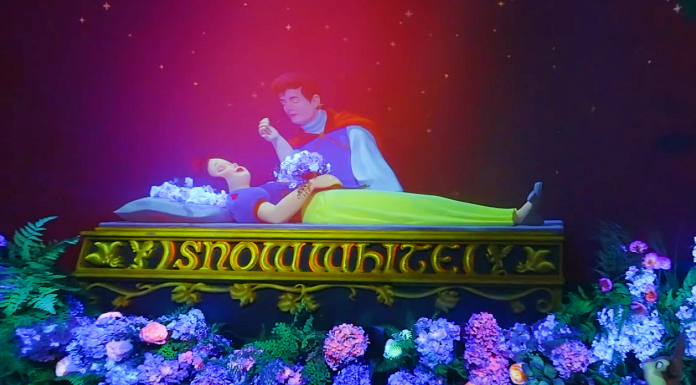It appears that even in the self-described “happiest place on earth,” some woke millennials may need a safe space.
In the latest battle of the culture war, it’s Snow White versus the snowflakes.
During California’s lengthy coronavirus shutdown, a beloved Disneyland ride underwent a few improvements, according to an article in SFGate.
The park is set to unveil Snow White’s Enchanted Wish, a revamp of Snow White’s Scary Adventures, which opened in 1955 but was recently criticized for being too frightening for today’s children.
Most notably, though, Disney replaced the last stretch of the ride—which saw the movie’s Evil Queen plummeting to her death—with a new scene that #MeToo activists may consider to be even more triggering.
“The new grand finale … is the moment when the Prince finds Snow White asleep under the Evil Queen’s spell and gives her ‘true love’s kiss’ to release her from the enchantment,” wrote SFGate. “A kiss he gives to her without her consent, while she’s asleep, which cannot possibly be true love if only one person knows it’s happening.”
The complaint illustrates the troubling position that Disney faces after having long embraced politically correct virtue-signaling—and even having hopped on board the cancel-culture bandwagon.
The company was unapologetic for firing Mandalorian star Gina Carano in February, prompting CEO Bob Chapek to grandstand during Disney’s shareholder meeting about his desire to promote a world of “harmony and peace” that it was his duty to social-engineer.
“The fact is that we have a tremendous opportunity now to bring this country back together and unite people,” Chapek said in explaining the rationale for firing a conservative star over her social media posts. “One thing we can all agree on is the power of Disney to unite us all.”
But it seems that Disney’s only power may be to unite everyone against it.
“Haven’t we already agreed that consent in early Disney movies is a major issue?” said SFGate in reaction to the Snow White assault. “That teaching kids that kissing, when it hasn’t been established if both parties are willing to engage, is not OK?”
The San Francisco outlet said it was especially disappointed to see Disney lapsing into its old ways after it had made such progress in capitulating to leftist demands previously.
“It’s hard to understand why the Disneyland of 2021 would choose to add a scene with such old fashioned ideas of what a man is allowed to do to a woman, especially given the company’s current emphasis on removing problematic scenes from rides like Jungle Cruise and Splash Mountain,” said the article.
“Why not re-imagine an ending in keeping with the spirit of the movie and Snow White’s place in the Disney canon, but that avoids this problem?” it continued.
FULL-CIRCLE FOLKLORE

The problem is a far cry from generations before, when Disney’s biggest criticism was that the Disneyfication of its stories overly sugar-coated what were otherwise dark and gritty tales of folklore collected by writers like the Brothers Grimm and Hans Christian Andersen.
In the Brothers Grimm’s version, which likely was considered the source material for the 1938 animated feature, Snow White actually was not awakened with a kiss.
“And now the king’s son had it carried away by his servants on their shoulders,” says the story. “And it happened that they stumbled over a tree-stump, and with the shock the poisonous piece of apple which Snow White had bitten off came out of her throat.”
However, other parts of the tale that Disney omitted may not be to all tastes—such as the Evil Queen’s Hannibal Lecter-like turn when the Huntsman brings her back the vital organs of a bear cub.
“And as a young bear just then came running by he stabbed it, and cut out its lung and liver and took them to the queen as proof that the child was dead,” says the story. “The cook had to salt them, and the wicked queen ate them, and thought she had eaten the lung and liver of Snow White.”
While they may have preferred cannibalism to date rape, the Grimms did have at least one story involving a non-consensual kiss—their version of “Little Brier-Rose” (aka Sleeping Beauty).
But that, in turn, was a romanticized retelling of the Charles Perrault tale, in which the prince’s mother attempts to eat her own grandchildren.
Perrault’s tale was itself a toned-down version of Giambattista Basile’s “Sun, Moon, and Talia,” in which the unconscious maiden is raped and gives birth to twins, who then dislodge the enchanted splinter from her finger while attempting to nurse.
Fortunately, all meet with happier fates than the Little Mermaid.

